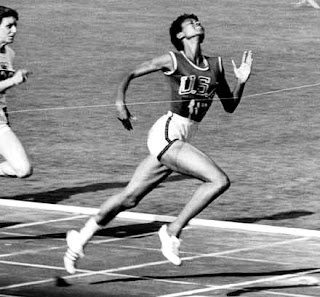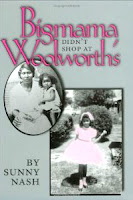Black Female Olympic Gold Medal Winners helped to change the world's perception of black Women.
 |
Tydie Pickett (far left) and Louise Stokes (far right)
Track and Field, 1936 Berlin Olympic Games
|
With all that gold having been earned by African American women at the 2016 Summer Olympics in Rio, we should remember the first African American women to win Olympic medals, lest we forget who fought Jim Crow in sports and helped lay the groundwork for black female gold medalists in the 2016 Summer Olympic in Rio.
In 1929, the all-black school, Tuskegee Institute, now Tuskegee University, started one of the first track and field programs for women in the United States. In 1932, when violent Jim Crow traditions gripped the nation attempting to put down a growing Civil Rights Movement, Tuskegee Institute sent Louise Stokes and Tydie Pickett to Los Angeles, California, where the two female college track and field stars qualified for the U.S. Olympic 400-meter relay track and field team. However, the two black women were replaced by white runners they had beaten.
"By 1936, the year Alpine skiing was opened to women in the XI Olympiad in Berlin, Germany, the first African-American women, Louise Stokes and Anna “Tydie” Pickett, were permitted to compete in the games.[vi] Stokes and Pickett were initially qualified for the 1932 Olympics held in Los Angeles, California, but they were disqualified based on..." Read more at the Merry Dressmaker.
 |
| Rosa Parks Booking Photo Montgomery Bus Boycott |
Rosa Parks, a seamstress and not a track star, ran a race that lifted court rulings from paper to real life.
The year the first two black American women were allowed to compete in the 1936 Berlin Olympics, 23-year-old Rosa Parks started her journey toward becoming "Mother of the Civil Rights Movement." This was during a time in American Jim Crow history that every positive move an African American made was used to fight discrimination and oppression. Eventually, Rosa Parks would spend 1955-56 leading the Montgomery Bus Boycott with Martin Luther King to start the demise of Jim Crow laws with a Supreme Court ruling.
 |
| Audrey "Mickey" Patterson President Harry S. Truman The White House 1948 |
Audrey Patterson
The Olympic Games were cancelled in 1940 and 1944 as many Americans were glued to the radio listening for developments of war with Germany. After Stokes and Pickett in 1936, the next time a black American woman competed in the Olympics was in 1948. At this time, Rosa Parks had already started her long career with the Montgomery, Alabama, branch of the National Association for the Advancement of Colored People (NAACP).
At the 1948 London Olympics, Audrey "Mickey" Patterson of Tennessee State became the first African American woman in Olympic history to win a medal. She won a bronze medal for the 200-meter dash, the first time the 200-meter race was included for female competitors.
 |
| Alice Coachman (1923-2014) High Jump Gold Medal Winner 1948 Summer Olympics in London, England |
Days after Audrey Patterson won bronze, Alice Coachman became the only U.S. female athlete of any race to win gold at the 1948 Summer Olympics in London.
Coachman's gold medal provided more fuel for the civil rights struggle against Jim Crow in the U.S. and around the world.
 |
| Wilma Rudolph, 1960 Olympic Summer Games, Rome |
Wilma Rudolph
In 1960, Wilma Rudolph of Tennessee State, who had overcome polio, made national headlines in radio, television, the black media and mainstream newspapers when she became the first U.S. female to win three gold medals in track and field at the 1960 Rome Olympics, picking up the athlete's civil rights struggle against Jim Cow where Alice Coachmen left off at the 1948 London Olympics.
 |
| Florence "Flo Jo" Griffith-Joyner (1959-1998) and President Ronald Reagan (1911-2004) |
Florence “Flo Jo” Joyner
National television loved Florence Joyner of California State University, Northridge, as much as any African American actress in the movies in young black Hollywood. Joyner’s flashy, stylish speed at the 1988 Summer Olympics in Seoul, South Korea, won her the title of the fastest female in the world and most glamorous woman in track.
 |
| Dominique Dawes 1996 Olympic Games, Atlanta |
Dominique Dawes
In the 1996 Summer Olympics in Atlanta, Georgia, Dominique Dawes became the first African American gymnast to win Olympic gold, and remained the only gymnastics star until the 2012 London Olympics when Gabby Douglas, became the first African American gymnast to win the Olympic Individual All-around gold medal.
 |
| President Barack Obama and 2012 U.S. Olympic gymnastics Fierce Five L-R: Aly Raisman, Gabby Douglas, McKayla Maroney, Kyla Ross, Jordyn Wieber |
Gabby Douglas
Gabrielle Christina Victoria "Gabby" Douglas was in 1995 in Virginia Beach, Virginia, where she began gymnastics at age six. At age eight, Douglas had won the Level-4 all-around gymnastics title at the 2004 Virginia State Championships. At age 14, Douglas moved from Virginia Beach, Virginia to West Des Moines, Iowa, to live with a host family, be home schooled and trained under Liang Chow, the former coach of 2007 World Champion and 2008 Summer Olympics gold medalist, Shawn Johnson.
Serena and Venus Williams
Serena Williams and Venus Williams won third women's doubles Olympic Tennis gold medal. The doors for the sisters were opened on July 6, 1957, by Althea Gibson, the first African American woman to win the All-England Tennis Championships at Wimbledon. That was three decades before Venus and Serena were born in the 1980s.
 |
| Althea Gibson (1927-2003) |
Althea Gibson
Althea Gibson began tennis lessons at age 14 and fought her way through a segregated career during the Jim Crow era. When touring, she was denied rooms in hotels, tables in restaurants and comfortable accommodations while traveling in the United States. Her persistence made careers possible for other African American tennis players, including Arthur Ashe and the William sisters.
Gibson defeated fellow American, white tennis player, Darlene Hard, then teamed up with her former opponent to win the women’s doubles title. The following year, Gibson successfully defended her singles title at Wimbledon. Gibson and was named Woman Athlete of the Year in 1957 by the Associated Press, earning the honor again the following year.
 |
| Ora Washington (1898–1971) |
Ora Washington
The door for Althea Gibson was opened by black female tennis star, Ora Washington, who picked up a tennis racket and won her first American Tennis Association (ATA) singles title in 1929. She won the ATA's national singles title eight times in nine years and held the title until 1937, a record that stood until 1947, when Althea Gibson won 10 straight titles. Washington of Philadelphia, Pennsylvania, known as the "Queen of Tennis," also won 12 straight doubles championships.
This has been a review of a few female African American Olympians and their contributions to the Civil Rights Movement and the improvement of U.S. race relations through Olympic victories, social activism and politics. There are many other black females with amazing stories from the history of the Olympic Games and there will be many more to come.
This has been a review of a few female African American Olympians and their contributions to the Civil Rights Movement and the improvement of U.S. race relations through Olympic victories, social activism and politics. There are many other black females with amazing stories from the history of the Olympic Games and there will be many more to come.
 |
| Sunny Nash |
 |
| Bigmama Didn't Shop At Woolworth's by Sunny Nash Hard Cover Bigmama Didn't Shop at Woolworth's Amazon Kindle Bigmama Didn't Shop at Woolworth's |
Nash is also a producer, photographer, blogger and a leading writer on race relations in America--writes books, blogs, articles and reviews, and produces media and images on U.S. history and contemporary American topics, ranging from Jim Crow laws to social media networking, using her book, Bigmama Didn't Shop at Woolworth's, chosen by the Association of American University Presses for its value to understanding of U.S. race relations, to relate experiences about life with her part-Comanche grandmother.
Sunny Nash produces blogs, media, books, articles and images on history and contemporary topics, from slavery, the Civil War, Jim Crow and civil rights to post racism, social media, entertainment and technology using her book, Bigmama Didn’t Shop At Woolworth’s, as a basis for commentary and research.
"My book, 'Bigmama Didn't Shop At Woolworth's,' began in the 1990s. I was writing for Hearst and Knight-Ridder newspapers. The stories are about my childhood with my part-Comanche grandmother, Bigmama, my parents, relatives, friends, and others; and my interpretation of the events surrounding the Jim Crow South before and during the Civil Rights Movement.
Robin Fruble of Southern California said, "Every white person in America should read this book! Sunny Nash writes the story of her childhood without preaching or ranting but she made me realize for the first time just how much skin color changes how one experiences the world. But if your skin color is brown, it matters a great deal to a great number of people. I needed to learn that. Sunny Nash is a great teacher," Fruble said.
© 2012-2016 Sunny Nash. All Rights Reserved Worldwide.
~Thank You~

No comments:
Post a Comment
Note: Only a member of this blog may post a comment.